Nobody’s sure whether it’s because Ubisoft have seen Zero Dark Thirty, or because of the pursed lips that greeted Splinter Cell: Blacklist’s E3 demo. But an interactive torture scene demonstrated to the public last year – in which Sam Fisher pokes a man with a knife in an attempt to drain answers from his body – is now gone from the game.
“Definitely we are not going to see when the game’s coming out that there are torture scenes in it. That scene is not there anymore. I’ve not really heard anyone say they loved it,” Blacklist producer Andrew Wilson told Eurogamer. “It wasn’t nice to see any negative reaction to something you’ve thrown your life into.”
Wilson suggested that the scene was not representative of the tone his team were gunning for. So why show it at E3?
“Because the nature of E3, there are certain things that are easier to demonstrate,” said Wilson. “”The first thing I’d say about that is that possibly there was missing context – and in an unabridged snapshot, it seemed like pretty tough material. We’ve scaled a lot of that back, and as we’ve gone through the process of development there are always things that you feel are not working as well. Every game does this, and cuts certain things.”
Ubisoft creative director Maxime Beland told Kotaku that torture might still be a part of Blacklist’s world – but players won’t be instigating it.
“No, there will not be interactive torture in Blacklist,” he explained. “On Conviction, we called those ‘interrogations,’ right? And it was kind of, my vision of Conviction was that the player to be in control all the time. We had no camera cuts, I always wanted to make it feel that it was nonstop.
“We’re doing certain things with interrogation moments where you won’t be in control, but you will be in control of what you do with the guy after. So again, embracing that lethal/nonlethal side.”
Beland had a “big discussion” with game director Patrick Redding – whose baritone you’ll remember soundtracking various Far Cry 3 demonstrations – and the pair concluded that they haven’t found a way to have true moral choices in the game and “link it to gameplay”.
“As soon as you link it to gameplay, the player sees the matrix, he sees the gold pot at the end of the rainbow, and then he plays the system a lot more than he plays the true morality,” said Beland.
“What we talked about, and we had lunches and meetings about it, we said, let’s try something where it’s a true moral choice. You’re not going to get a thousand dollars if you don’t kill the guy and only five hundred if you do; let’s remove all the gameplay part of it. Let’s put the player into those situations, put them in control – because that’s where games shine – and then, hopefully, we’re treating it in a way that’s mature, that’s respectful, that will get people talking about it.”
I’m reminded of BioShock’s much-discussed Little Sister choice – one that had true material consequences in-game. I know that I didn’t compromise my choice in the name of optimisation – but nor did I ever really need the material rewards promised. What do you think? Are Beland and Redding right to separate moral choices from their in-game incentives?
Thanks, GamesIndustry.
